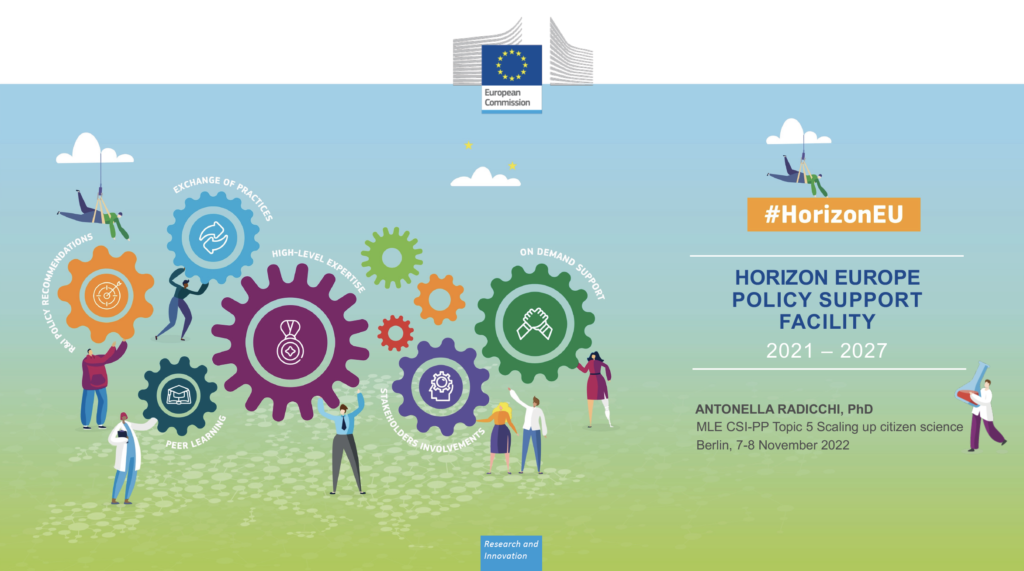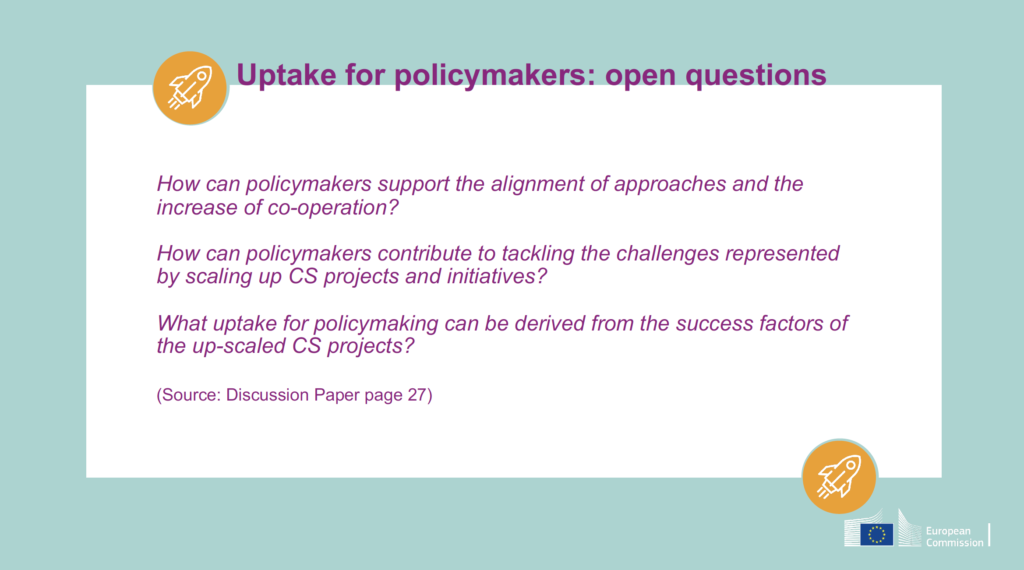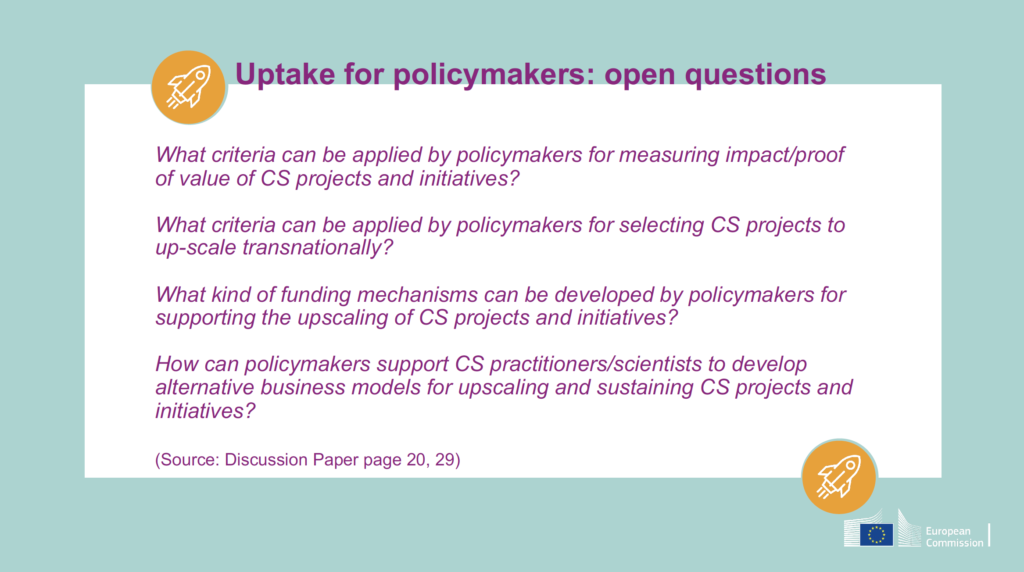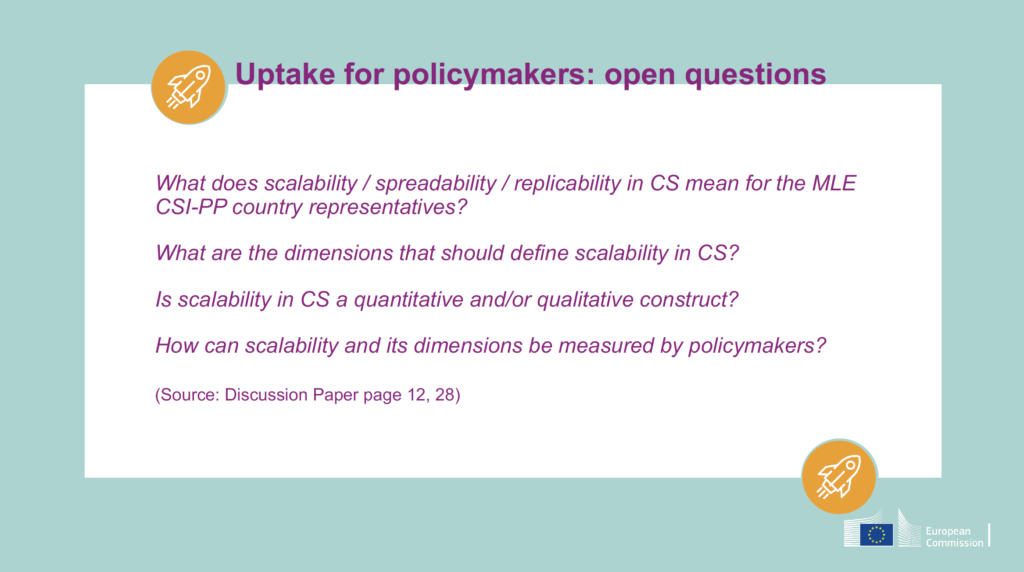
Antonella Radicchi
Architect and Urbanist, PhD
SCALING UP CITIZEN SCIENCE
THE MLE CITIZEN SCIENCE INITIATIVES – POLICY AND PRACTICE
Within the context of the Mutual Learning Exercise Citizen Science Initiatives – Policy and Practice – initiated by the European Commission D-G Research & Innovation in collaboration with 11 Member States’ representatives – I worked as High-Level Expert on Topic 5 Scaling up citizen science. In this role, I was responsible for doing research on the understudied topic of scaling up citizen science to prepare and write the Discussion Paper and the Thematic Report as well as curate a 2-day Workshop dedicated to exploring the topic via interactive sessions and focus groups held in Berlin on 7-8 November 2022.
TOPIC 5 – SCALING UP CITIZEN SCIENCE
Topic 5 in the series “Scaling up citizen science” addressed meanings, dimensions, models and approaches/strategies of scalability in citizen science as well as drivers, success factors and challenges of (up)scaling citizen science projects and initiatives across Europe.
Due to limited knowledge available in the literature about scaling up in citizen science, both the Topic 5 Discussion Paper and the Thematic Report draw on original content generated through a mixed methods approach which combined findings from i) a literature review, ii) a survey distributed among the MLE CSI-PP country representatives, iii) interviews with seven experts in citizen science and cognate disciplines, and iv) three working sessions held during the Berlin meeting on 7-8 November 2022.
The main outcomes of Topic 5 consist of:
- a multi-dimension qualitative definition of scaling up in citizen science,
- the MLE CSI-PP Responsible and Inclusive Scalability Framework,
- nine exemplary citizen science projects and initiatives and
- eight key areas of action for policymakers aimed at supporting the (up)scaling of citizen science projects and initiatives across Europe.
Firstly, the Thematic Report acknowledges that scaling up is a value/ambition that suits unique types of citizen science projects and initiatives. Hence it suggests that scaling up should be i) a ‘responsible’ and inclusive process, ii) context- and domain-dependent, iii) sustained by a sound logic consistent with the project/initiative, iv) driven by common scientific questions and common social challenges, and v) built on proven impact, related to science and scientific literacy, inclusion, regulatory frameworks, matters of concern (e.g., environmental, societal).
Secondly, drawing on this multi-dimension qualitative definition of scaling up, it introduces the MLECSI-PP Responsible and Inclusive Scalability Framework composed of four models of scalability (scaling up-out-deep-down) and two approaches/strategies (top-down/deliberate and bottom-up/accidental).
Thirdly, it presents five citizen science projects and initiatives exemplary of the four models and the two approaches/strategies of the MLECSI-PP Responsible and Inclusive Scalability Framework, namely: Plastic Pirates – Go Europe!, OpenStreetMap, CurieuzeNeuzen, Hush City and Roadkill. Furthermore, four exemplary upscaled citizen science projects are illustrated in the Discussion Paper, i.e., FotoQuest GO, The Star Spotting Experiment, Tea Bag Index, Dugnad for Havet (in English: Marine Citizen Science) [1].
Finally, the Thematic Report proposes eight key areas of action for policymakers:
- Rethink the meaning of Innovation in CS acknowledging that today innovation in CS stands in the processes of reproducing/sustaining/upscaling successful CS projects and initiatives[2].
- Adopt and promote a multi-dimension qualitative definition of scalability which stems from the triangulation of proof of value, matter of concern and social/legal alignment and, according to this definition, define specific evaluation criteria for selecting CS projects/initiatives to be scaled up.
- Ensure responsible scaling-up addresses the RRI dimensions[3] and ensure they are accounted in the design and development of the projects/initiatives to align outcomes with the values of society.
- Commit to ‘People First’ (up)scaling processes, acknowledging the importance of keeping people central and connected in the process of scaling CS projects/initiatives and taking action to remove the systemic barriers impeding people from actively participating in science producing ‘contextualised knowledge’ on the local/regional/national/EU level[4].
- Support a Responsible Scaling Ambition[5] in CS by designing specific funding programs and mechanisms, diversifying the sources/types of funding, and ensuring the funding lines and sources can be visible to CS grassroots movements and bottom-up CS projects/initiatives.
- Support the implementation of different models (up-out-deep-down) and approaches/strategies (top-down/deliberate, bottom-up/accidental) of scalability, acknowledging scalability in CS is context- and domain-dependent and should be responsible, inclusive and aligned with the logics of the projects/initiatives.
- Develop local/regional/national/European networks to foster collaboration and initiate discussions about the cultural transformation/s and implications expected via the scaled projects, with an emphasis on the language issue and its cultural and scientific implications.
- Support the exploitation of citizen-generated data from (up)scaled CS projects/initiatives integrating them in policies and policymaking programs at the local/regional/national/EU level.
YEAR/S
Research study, interviews, survey and focus groups: 2022
Writing and publications of the Thematic Report and Discussion Paper: 2022-2023
PROJECT PARTNERS
- European Commission D-G Research & Innovation – Policy Support Facility
- Ecorys
ACKNOWLEDGMENTS
The author would like to acknowledge the valuable contributions of the participants in the Mutual Learning Exercise Citizen Science Initiatives – Policy and Practice, the interviewees and the colleagues who contributed to the Discussion paper and the Thematic Report.
[1] An illustration of these four projects can be found in Section 4 of the Discussion paper “Scaling up citizen science” available at https://ec.europa.eu/research-and-innovation/en/statistics/policy-support-facility/psf-challenge/mutual-learning-exercise-citizen-science-initiatives-policy-and-practice.
[2] Schade 2022
[3] The RRI dimensions are public engagement, open access, gender equality, science education, ethics, and governance. Source: https://rri-tools.eu/about-rri
[4] Irwin (1995); Skarlatidou & Haklay (eds) (2021)
[5] Adapted from the term “Scaling Ambition” from Maturano (2020)



